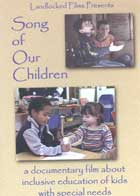
Song of Our Children 2005
Distributed by Fanlight Productions, 32 Court St., 21st Floor, Brooklyn, NY 11201; 800-876-1710
Produced by Landlocked Films
Directed by Beret E. Strong and John Tweedy in collaboration with the Price Initiatives at the University of Colorado, Boulder
DVD, color, 58 min.
College - Adult
Child Development, Psychology, Education
Date Entered: 07/15/2009
Reviewed by Carolyn Walden, Mervyn H. Sterne Library, University of Alabama at BirminghamAlthough the U. S. Congress in 1975 “mandated a free appropriate public education for all children in the least restrictive environment,” the National Council on Diversity reports that by the year 2000, none of the states had complied with the law. “Song of Our Children journeys from a past where children with disabilities were sometimes institutionalized for life, to the present, where pioneering schools are striving to make educational inclusion work for every child in the class.” Against a background of appropriate choral and guitar music, this film allows the viewer to not only reflect on the non-inclusive schools through black-and-white vignettes of times past through memories of selected individuals but to travel in time to schools that are meeting the challenges and opportunities of an inclusive education.
The film provides excellent information on inclusive education and demonstrates programs with a record of successful, positive experiences. The film features four students with a range of disabilities involving mental and physical challenges as they interact in inclusive school programs. The focus, as one educator indicates, is on “what they can do rather than what they can’t do.” To observe a portion of the school day through various activities and to listen to insightful comments from educators, parents and teachers provide an opportunity to be a part of their world for a brief time. To consider, also, that “over 6 million children have disabilities in the U.S. today,” and to hear a parent who suffered with Tourette’s syndrome describe sometimes painful challenges from his youth underscores the enormity of challenges facing our schools.
The variety of activities and the personal touch with each student gives a positive, uplifting approach to tremendous challenges for providing inclusive education. The presentation of the information is encouraging and instructive and leaves the viewer with a sense of hope for what can be accomplished with inclusion. Another film Boy in the World which explores how one school in Providence, Rhode Island provides an inclusive preschool experience for a Downs syndrome student is an excellent complement to this film. There is also a resource guide available for reference. Recommended for libraries with collections in education, child development, and psychology.